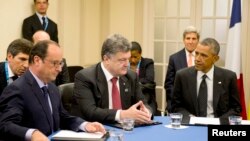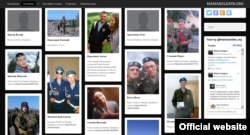Ukraine's president, Petro Poroshenko, received a show of support from Western leaders at a NATO summit on Thursday as a Kremlin peace offer failed to halt fighting the country’s east where pro-Russia rebels have been gaining the upper hand against Ukrainian troops.
The West has backed Kyiv with words and imposed economic sanctions against Moscow, but offered Ukraine only non-lethal military support after Russia annexed Crimea in March, and rebels, widely believed to be supported and supplied by Moscow, have risen up against Kyiv in the country’s east.
Poroshenko, even though Ukraine is not a NATO member, has been invited to the alliance’s summit in Wales, where he has already met with U.S. President Barack Obama, summit host and British prime minister David Cameron, Germany's Angela Merkel, France's Francois Hollande and Italy's Matteo Renzi.
“To the east, Russia has ripped up the rule book with its illegal, self-declared annexation of Crimea and its troops on Ukrainian soil threatening and undermining a sovereign nation state,” Obama and Cameron wrote in a joint newspaper editorial.
Participants of the meeting with Poroshenko agreed that Russia should face increased sanctions.
“The leaders reiterated their condemnation of Russia's continued flagrant violation of Ukraine's sovereignty and territorial integrity, and agreed on the need for Russia to face increased costs for its actions,” a White House statement said.
Russia denies its involvement in the conflict in Ukraine, despite satellite imagery the West points to as proof of Russian troop and hardware movements in the country’s east.
Russian President Vladimir Putin on Wednesday offered a seven-point peace plan for Ukraine but it was dismissed by NATO chief Anders Fogh Rasmussen, who instead called on Moscow to use “genuine efforts” to help settle the conflict.
Putin's peace offer would leave pro-Russia separatists in control of Ukraine’s two eastern regions that have been ravaged by months of fighting. It would also require Ukraine to maintain its non-aligned status.
‘Party of war’
Meanwhile, Russia has accused the United States on Thursday of backing what it called the “party of war” in Kyiv and said it was counting on a response from the leadership in Ukraine and rebels in its east to a Kremlin cease-fire plan.
"The surge in anti-Russian rhetoric that we have seen exactly when there is a very active effort to seek a political solution shows that the party of war in Kyiv has active external support, in this case from the United States,” Russian Foreign Minister Sergei Lavrov told a news conference after talks with his Kyrgyz counterpart.
In contrast, he said, Russia was “doing and will do” everything in its power to secure peace in eastern Ukraine.
Lavrov was apparently referring to U.S. President Barack Obama's remarks about NATO keeping the door open for new members.
Putin’s peace plan is to be discussed at talks in Friday in Minsk, Belarus, between representatives of the Ukrainian and Russian governments, pro-Russia rebels in Ukraine’s east and officials from the Organization for Security and Cooperation in Europe.
Ukrainian Prime Minister Arseniy Yatsenyuk has criticized Putin's plan saying it was a veiled effort “to destroy Ukraine and restore the Soviet Union.”
The European Union might hit Russia with a new round of sanctions this week over its role in the Ukraine conflict. Moscow has retaliated with its own punitive measures banning imports of some Western products.
Cease-fire, peace plan still possible
Meanwhile, Ukraine's President Petro Poroshenko says he is ready to order a halt to five months of fighting near the Russian border, if a bilateral cease-fire deal is signed Friday with pro-Russian separatists.
He said he expects a deal signing Friday in the Belarusian capital, Minsk, that could lead to the "gradual introduction" of a peace plan.
Separatists earlier said they also are ready to sign a truce, if a deal is signed.
Despite the Ukraine leader's guarded optimism, there were reports late Thursday of explosions on the outskirts of the Ukrainian border city of Mariupol.
Details were sketchy, but Reuters news agency quoted a Ukrainian military source as saying government troops guarding the city were bracing for a potential attack.
McCain in Kyiv
Meanwhile, U.S. Senator John McCain blasted Russia for its actions in Ukraine and called on the world to support Kyiv's new Western-oriented government.
“If [Russian President Vladimir] Putin can invade a sovereign country for no other reason than greed, belligerence and imperial ambition, what is to stop others from doing so?” asked McCain, speaking in the Ukrainian capital late Thursday after meetings with Ukrainian officials.
“If that principle does not apply in Ukraine, why then should it apply anywhere else,” asked the Republican lawmaker during what he said was his fourth trip to Kyiv since the beginning of massive anti-government protests last November which toppled a pro-Moscow government in the country.
“Our principles will count for little if they are not backed by our power and resolve,” added he.
Stressing that Ukrainian leaders are not asking for foreign military involvement, McCain said they are deserving of outside support because “the fundamental principles of the European and global order are at stake here.”
He said if the international community does not stand behind Ukraine in this hour of need, then “the darkness in our world will only grow.”
“Vladimir Putin wants to restore the old Russian empire. He cannot stand a free, democratic, prosperous Ukraine, because sooner or later the people of Russia would want to have that kind of lifestyle as well,” said McCain.
NATO points to strong Russian presence
Despite Russia’s claims to the contrary, rebel forces in eastern Ukraine have reportedly been receiving increased support from Moscow.
“We are still seeing several thousand Russian combat troops on the ground inside Ukraine, equipped with hundreds of tanks and armored vehicles, so [there is] no substantial change in the disposition of Russian forces inside Ukraine,” a NATO officer, speaking on condition of anonymity, told Reuters on the sidelines of alliance’s summit in Wales.
Previously, NATO was putting the number of Russian troops in Ukraine at “well over 1,000.”
On the issue of lethal military assistance to Ukraine to help it counter what is seen as Russian aggression, NATO chief Rasmussen said at the summit that it was up to individual alliance members to decide whether to supply arms to Kyiv.
Mothers of Russian soldiers launch website
Mothers of Russian soldiers, claiming to have lost their sons to the conflict in Ukraine, have launched a website hoping to draw attention to their plight.
In defiance of Kremlin denials of direct Russian military involvement in Ukraine, mamasoldata.org (soldier’s mother) features photographs and avatars of more than 100 servicemen the mothers say have been killed in Ukraine or gone missing.
The website identifies ‘Soldier’s Mother’ as a "civic organization, created against the backdrop of recent events that have shaken our country… as our soldier sons are being sent to die in a neighboring nation.”
“The time has come for soldiers’ mothers to come together to create a united front in defense of our children, and in defense of peace in our country,” the website adds.
Some material for this report came from Reuters.






